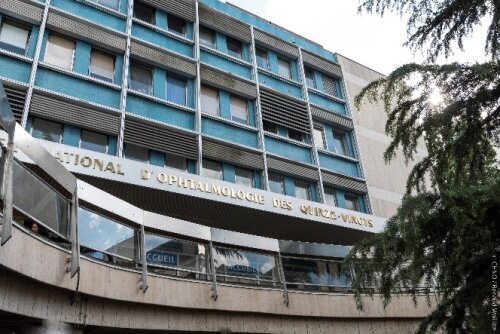Founded in 1260 as a hospice for impoverished blind people, it housed 300 beds (15x20) and it based its name on the vigesimal numerical system used at that time in France. In 1880, it moved to its current location, contributing to the creation of the Quinze-Vingts Quartier of Paris around the hospital.
Today, it is known as the Quinze-Vingts (XV-XX) National Ophthalmology Hospital, based in the center of Paris. In 2017, a total of 21.581 hospital stays, 309.000 consultations and additional procedures, and 60.240 emergency visits were counted. These figures make Quinze-Vingt a reference centre for the development of ophthalmological clinical trials.

In 2004, within XV-XX facilities, the Clinical Investigation Center (CIC) was opened as the first research center in France dedicated exclusively to vision pathologies. More than 60 clinical trials are currently ongoing at CIC to test a wide range of therapeutic strategies for age-related macular degeneration, inherited eye diseases, diabetic retinopathy, retinal venous occlusions, glaucoma, Dry Eye Disease, biomarkers and high-resolution imaging of ocular surface pathologies, and toxicology of anti-glaucoma drugs.
In 2008, this research environment also gave rise to the Vision Institute, one of the most important vision research centers in Europe. Currently it is composed of more than 18 teams distributed in five departments, ranging from basic to applied research. The mission of the Institute is to identify patient needs, characterize their disorders, model them with the aim of uncovering therapeutic targets for drug and device development, and finally to return to the patients to validate the results. It also serves as a link with the industrial sector as it hosts eight pharmaceutical companies.

In 2018, Quinze-Vingts National Ophthalmology Hospital, Inserm, Sorbonne Université, and the Seeing and Hearing Foundation were awarded the highly prestigious IHU (Institut Hospitalo-Universitaire) label for their FORESIGHT Project. Centered around the Vision Institute, the project combines fundamental and clinical research of excellence to improve the knowledge and treatment of age-related macular degeneration (AMD), glaucoma, diabetic retinopathy and degenerative disease of genetic origin. The major funding accompanying this new status will considerably intensify the momentum of diagnostic and therapeutic progress driven by the IHU teams and their partners.